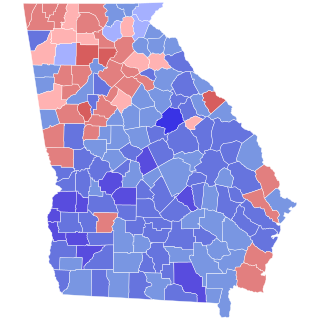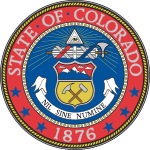
The Conservative Party of New York State is an American political party founded in 1962 following conservative dissatisfaction with the Republican Party in New York. Running on the Conservative Party line, James L. Buckley won election to the U.S. Senate in 1970 and served for one term. Since 2010, the party has held "Row C" on New York ballots—the third-place ballot position, directly below the Democratic and Republican parties—because it received the third-highest number of votes of any political party in the 2010, 2014, 2018, and 2022 New York gubernatorial elections. The party is known for its strategy of attempting to influence the Republican Party in a more conservative direction.

The 1974 United States Senate elections were held on November 5, with the 34 seats of Class 3 contested in regular elections. They occurred in the wake of the Watergate scandal, Richard M. Nixon's resignation from the presidency, and Gerald Ford's subsequent pardon of Nixon. Economic issues, specifically inflation and stagnation, were also a factor that contributed to Republican losses. As an immediate result of the November 1974 elections, Democrats made a net gain of three seats from the Republicans, as they defeated Republican incumbents in Colorado and Kentucky and picked up open seats in Florida and Vermont, while Republicans won the open seat in Nevada. Following the elections, at the beginning of the 94th U.S. Congress, the Democratic caucus controlled 60 seats, and the Republican caucus controlled 38 seats.

United States gubernatorial elections were held on November 2, 2004, in 11 states and two territories. There was no net gain in seats for either party, as Democrats picked up an open seat in Montana while defeating incumbent Craig Benson in New Hampshire, while Republicans defeated incumbent Joe Kernan in Indiana and won Missouri after Bob Holden lost in the primary. These elections coincided with the presidential election.

United States gubernatorial elections were held on November 5, 2002, in 36 states and two territories. The Republicans won eight seats previously held by the Democrats, as well as the seat previously held by Minnesota governor Jesse Ventura, who was elected on the Reform Party ticket but had since renounced his party affiliation. The Democrats won 10 seats previously held by the Republicans, as well as the seat previously held by Maine governor Angus King, an independent. The elections were held concurrently with the other United States elections of 2002.

The 2002 Georgia gubernatorial election was held on November 5, 2002. Incumbent Democratic governor Roy Barnes sought re-election to a second term as governor. State Senator Sonny Perdue emerged as the Republican nominee from a crowded and hotly contested primary, and he faced off against Barnes, who had faced no opponents in his primary election, in the general election. Though Barnes had been nicknamed "King Roy" due to his unique ability to get his legislative priorities passed, he faced a backlash among Georgia voters due to his proposal to change the state flag from its Confederate design.

The 2010 Colorado gubernatorial election was held on Tuesday, November 2, 2010, to elect the Governor of Colorado, who would serve a four-year term that began in January 2011. One-term incumbent Democrat Bill Ritter announced that he would not run for re-election in 2010. Dan Maes, backed by the Tea Party movement, won the Republican nomination in the primary with 50.6% of the vote and a 1.3% margin over rival Scott McInnis. In claiming victory, Maes called on former representative Tom Tancredo, running as the Constitution Party's nominee to "stop your campaign tonight." Denver mayor John Hickenlooper was unopposed for the Democratic nomination. Hickenlooper won the race with over 50% of the vote.

The 1998 Colorado gubernatorial election was held on November 3, 1998 to select the governor of the state of Colorado. Under newly applicable term limits, incumbent Governor Roy Romer, a Democrat, was unable to seek re-election. Lieutenant Governor Gail Schoettler, ran to succeed Romer, and won the Democratic primary; her running mate, Bernie Buescher, won the lieutenant-gubernatorial primary unopposed. In the Republican primary, Bill Owens, the State Treasurer, and his eventual running mate, Joe Rogers, won their respective primaries by wide margins.

The 1998 Georgia gubernatorial election was held on November 3, 1998. Incumbent Democratic governor Zell Miller was unable to seek re-election due to term limits, therefore creating an open seat. To replace him, State Representative Roy Barnes won the Democratic Party's nomination after a close and highly contested primary election, while businessman Guy Millner, who had run for governor and the United States Senate in the previous four years, won the nomination of the Republican Party.

The 2002 New Hampshire gubernatorial election was held on November 5, 2002. Three-term incumbent Democratic governor Jeanne Shaheen opted to unsuccessfully run for the United States Senate rather than seek a fourth term as governor. Republican Craig Benson, a self-funded businessman, defeated Democrat Mark Fernald, a state senator, in the general election after both won contested primary elections.

The 2014 Oregon gubernatorial election was held on November 4, 2014, to elect the Governor of Oregon, concurrently with other elections in Oregon and across the United States.

The 2018 Colorado gubernatorial election took place on November 6, 2018, to elect the next governor of Colorado. Incumbent Democratic governor John Hickenlooper was term-limited and could not seek a third consecutive term. The primary election was held on June 26.

United States gubernatorial elections were held on November 8, 2022, in 36 states and three territories. As most governors serve four-year terms, the last regular gubernatorial elections for all but two of the seats took place in the 2018 U.S. gubernatorial elections. The gubernatorial elections took place concurrently with several other federal, state, and local elections, as part of the 2022 midterm elections.

The 1990 Colorado gubernatorial election was held on November 6, 1990. Incumbent Democrat Roy Romer defeated Republican nominee John Andrews with 61.89% of the vote.

The 1986 Colorado gubernatorial election was held on November 4, 1986. Democratic nominee Roy Romer defeated Republican nominee Ted L. Strickland with 58.20% of the vote.

The 2022 Colorado gubernatorial election was held on November 8, 2022. Incumbent Democratic governor Jared Polis won re-election to a second term, defeating Republican University of Colorado regent Heidi Ganahl in a landslide. Ganahl conceded on election night. The primary election was held on June 28.

The 1960 Arkansas gubernatorial election was held on November 8, 1960.

The 1942 Arkansas gubernatorial election was held on November 3, 1942. Incumbent Democratic Governor Homer Martin Adkins was re-elected to a second term in office.

The 1920 Illinois gubernatorial election was held on November 2, 1920.

The 2022 Colorado Attorney General election was held on Tuesday, November 8, to elect the Attorney General of Colorado. Incumbent attorney general Phil Weiser won re-election to a second term, improving on his 2018 results.

A general election was held in the U.S. state of Maryland on November 8, 2022. All of Maryland's executive officers were up for election as well as all of Maryland's eight seats in the United States House of Representatives, one of its U.S. senators, and the state legislature. Primaries were held on July 19, 2022. Polls were open from 7 AM to 8 PM EST.























